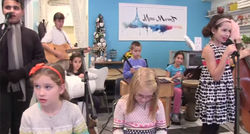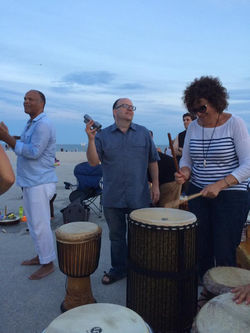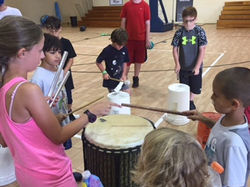
About us
Jack Licitra began a different kind of music teaching practice in 2001. He believes music has an incredible healing power that the world needs now- more then ever. Since then South Bay Arts has combined private lessons, kids concerts, community service and more to share that healing power, and help create an inspired community. Join us on our journey to fill the world with beauty and hope!
Want Your Kid To Be A Musician?
Treat Them Like They Already Are One.
Jack Licitra
If you ask a kid with limited musical experience to write a song and perform it for an audience, what will happen? They’ll write that song … and then another, and another … and find courage and self-confidence as a performing musician.
At The Muse Within, we’ve seen that when young people think of themselves as musicians, they quickly move forward with learning fundamentals, practicing, and performing. We don’t care whether they’re “gifted” or “expert.” It doesn’t matter if a child is just getting started in music, or if they’ve already had some instruction. When they believe themselves to be musicians, they act like it.
Does this transformation happen by itself? Yes and no. There are ways to make it happen.
“Proficiency through participation” is one of them. That means everybody plays, even kids who’ve never played music, or sung, or written songs before. They still need to learn fundamentals, of course. But when you perform regularly, it’s the process that develops your proficiency, whatever level you’re on. This process-oriented learning gives kids the feeling and the spirit of music. It lets that spirit become part of them.
Kids joining together to share the creative process will also bring them forward as musicians. If music is new to them, or if doesn’t come as naturally as it does to some of their peers, the more proficient players will model to the other kids what their potential is. The sharing is part of the learning.
We do things differently at The Muse Within. We get kids out there more. We don’t believe that a music student’s performance has to happen at recitals in music school. Don’t be surprised if you see The Muse Within kids performing at a pumpkin patch, or a soccer game, or a Chamber of Commerce dinner. We put young musicians in unexpected places and settings where there wouldn’t have been music before. It’s not only about the music. Performing helps kids with low self-esteem. It also helps kids who feel anxiety about interacting with others, and is a gentle but powerful way for them to get used to communicating and collaborating.
When kids take their emotions and thoughts and and pour that into a song they’ve written, they understand themselves better. It also teaches them how to organize their thoughts.
Performing with their peers gives them a sense of purpose and so many connections. It builds a feeling of belonging, to a music ensemble and to the community they live in. It connects them to the music in an undeniable way.
Scientific studies back up what we’ve observed about kids who perform music. Researchers at the University of Vermont College of Medicine looked at brain scans of 232 healthy children from ages 6 to 18. They found that the kids’ brains physically changed as a result of learning to play music. The more they made music, the better the children got at attention skills, managing anxiety and emotional maturity. In other words, with music you can “train your brain” to improve behavior and emotional control. Other studies have demonstrated that kids who play in music ensembles have better GPAs. And the College Entrance Examination Board – which administers the SATs – published a study on kids who learn music and art. They found that students involved with music and art score significantly higher on both math and verbal sections of their SATs.
In the recently published book “Norwich: One Tiny Vermont Town’s Secret to Happiness and Excellence”, author Karen Crouse examined a town in Vermont that produces Olympic athletes at a surprising rate. In Norwich, no kid is cut from recreational sports leagues – everybody plays. They play in a non-competitive atmosphere where they learn to feel a connection with physical activity. That’s the same type of approach The Muse Within is using with music. Above all, children and teenagers who write and play music are creating a culture of participation. And these kids are helping to foster a local music scene that everybody can enjoy.
 |  |  |
|---|---|---|
 |  |  |
 |  |  |
 |  |  |
 |  |  |
 |  |  |
 |  |  |
 |  |  |
 |  |  |
 |  |  |
 |  |  |
